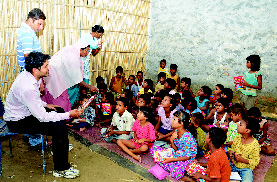
Can you imagine that in a wealthy City like Gurgaon, which has one of the highest per capita incomes in the country, there are kids who have never touched a fruit in their life – forget eating it? Invisible to the larger society living in gated communities, these kids are living close to us in the slums, that exist mostly in unauthorised colonies – or on the outskirts of 40 villages.
Infested by disease, malnourished, and devoid of any support from their families, these kids fall prey to many social evils, says Dr. Brijesh Tripathi, who runs the Maxvision Social Welfare Society – an NGO that has been working for the welfare of these slum children since the last 5 years. Tripathi, who is a doctorate in Ayurveda, says that despite the wealth in the City, there is large disparity in income. The migrant labour that lives in slums has pathetic living standards.
The kids in these slums have no option but to work as child labour, or beg, to generate additional income for the family, he says. “To ensure that these needy children are not exploited, we have set up six Centres across the City – and more will be opened as funds become available,” he informs. These Centres provide both education as well as vocation training to the slum children, who also work during the day. The aim is not to stop these kids from working, as many help in running the home and hearth of their family,”
says Tripathi.
Maxvision has opened three Centres in Ashok Vihar Phase 3, one at Basai Jhuggis, one in Krishna Nagar slum, one in Qadipur, and another in Khdeki Majra. Each Centre has three teachers and one peon, who join efforts to bring more kids into the fold, so that they become literate and learn some skills that could help them in future. “At these schools, we teach them basic numbers, addition, subtraction, alphabets, identification of animals, fruits and similar stuff. We continue teaching them till they are ready for mainstream education,” says Tripathi. Since the opening of these facilities, about 450 students from slums have joined middle and high schools, and are on their way to a better future.
Education, he says, opens the doors to a good future; and the efforts of his organisation are focused towards this. The salary of the teachers, and other staff at the Centres, is paid by the office of the Additional Deputy Commissioner, under a government scheme for the upliftment of slum children.
“The living condition of the kids in these slums is very bad, and the food they eat is poor. We were astonished to know that the majority of them had never touched a fruit in their life – as their staple diet is chapatti and some form of sabzi,” says Tripathi. To correct this situation, many times the students are given fruits, and asked to feel and eat them, so that they can connect with what they see in the books,” he says.
Despite the resource handicap and shortcomings, the kids in the slums are not devoid of talent. “They have sharp memory, good observation skills, and many are very good with their hands – as they have been working in shops and factories,” he says. He cites the case of Gudiya, who attends the Krishna Nagar centre. “This girl is a great talent. She is a very good artist, and we often give her colours, paper and other materials as she can’t afford them,” Tripathi says, while mentioning their own lack of resources.
Another major problem that his NGO faces in educating these kids is the lack of support from families, and the floating nature of their stay. “We often find that kids leave the school without informing us, as their parents want them to work. Some of them also leave, as the family finds work in other cities, or goes back to home for seasonal farming,” he says. Kids who hail from Bangladesh, in particular, suffer because their families strongly oppose any kind of education. “We took the help of the Councillor, and went to a large slum in Rajendra Park, but no one listened. They prefer their kids to work as kabadis, and earn money,” he says.
To overcome this hurdle, particularly to bring back the dropouts, the teachers have been asked to become a part of the local community. The teachers regularly scout the slums, motivate parents, and ask them to send their wards. They are told that only education can get them out of the slums, he says.
On the financial front, the government mainly provides salaries to run these Centres. “We depend on philanthropists and corporates to help us with the educational material, dresses, bags and other material that can be given to kids,” he says.
Presently the Society helps around 500 slum kids through the Centres; but there has been a spurt in the number after the District Administration asked ISKCON to provide mid-day meals to the kids attending these Centres. This has greatly improved attendance, admits Tripathi.
Himself a doctorate in Ayurveda, Tripathi says he was motivated to work in the social sector because he wanted to contribute something to the society. “I have worked with a major health care provider in Gurgaon, and collected a hefty package – but my conscience also pricked me to work for the weaker sections of society,” he says.
Working for the slum children is a difficult task, he admits but says that the smiles on the faces of kids, after they learn and achieve, makes it worthwhile for him. He cites the names of several slum kids whose talent has been identified, and is being harnessed, due to the efforts made by him and his organisation.
Read More...